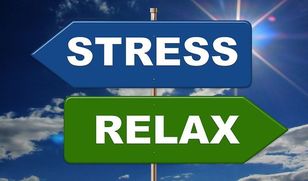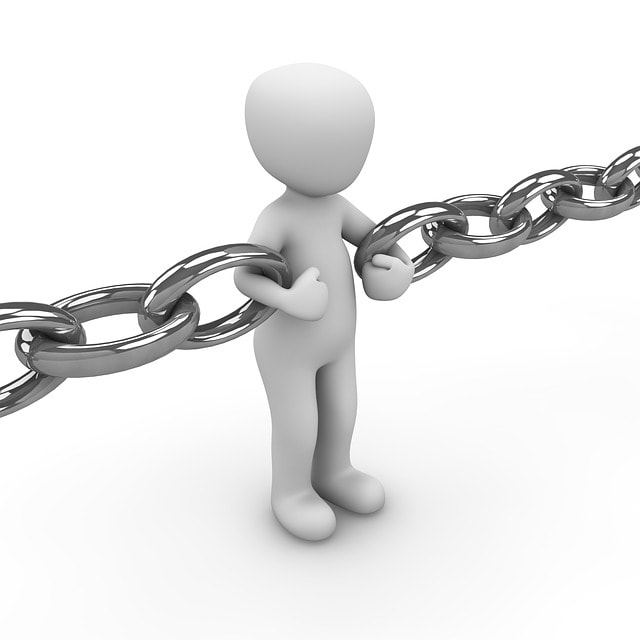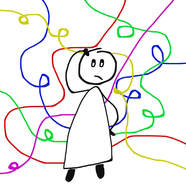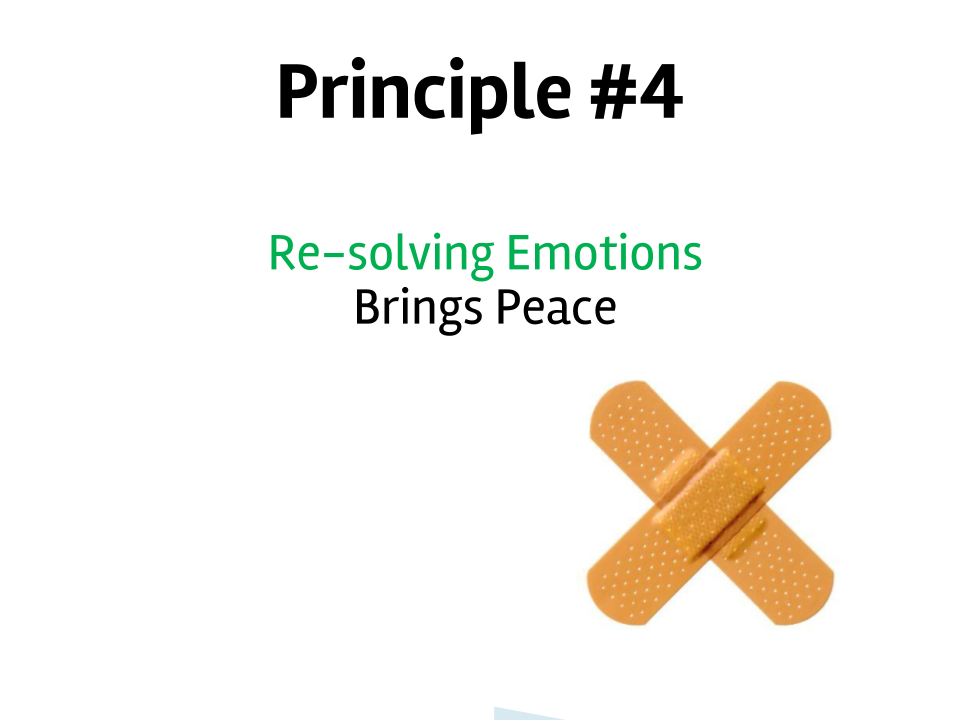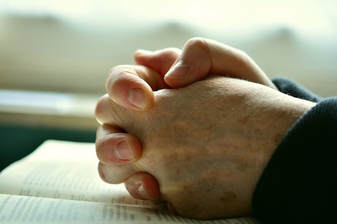 Principle: Emotions lodge in our bodies. When we feel stress, we feel tension in our bodies, on a physical level. Have you ever really thought about that? Our shoulders might tighten. We might feel a headache coming on. Our teeth clench, or our jaw tightens. We even breathe differently. In addition to those tightening sensations, our physical bodies change out of being “present” with what is happening to “tightening” to preparing for what we “anticipate” will be happening. I think of it in this way: My body is traveling into the “future” -- but I still have to cope in the present. Of course, I am now having to cope in two dimensions - present, and future -- and that rarely works out well. Our physical body reacts to what our thoughts dictate. That is what stress "is." If our thoughts are “in the future,” our bodies will react as if the future is now. What’s the first step to eliminating stress? The first step, then, is not necessarily to resolve whatever the issue is -- because oftentimes we need time to work through the issue. Things happen. We do not have to resolve the issues, however, while we feel stressed and tight inside. We need to simply remind ourselves to be fully present -- to ignore the tendency to put ourselves into "another dimension." It's not that we don't plan for the future, but that we manage how we plan. We can say something like this: "I am going to be present, and function in how things are right now." Then it is much easier to relax. We can also say to ourselves, "For five minutes I am going to think about the future, so that I can plan and find out how to prepare, but then I am going to remain in the present while I do those things." That helps us know that we're present, and don't have to be in two places at one time. Our bodies will be able to calm down, and we will be able to handle the situation more effectively. Question: When you feel stress, what happens in your body?
0 Comments
Is Doing DIshes a Chore? I was in a leadership seminar, and the speaker was talking about the importance of personal development. The seminar was very motivational, until……………… She mixed “principle” with “advice.” “Eliminate unnecessary things from your life,” she said, “so that you have more time to focus on what is really important.” Agreed - I can see that there would be truth in that statement. Then she went on to give an example. That is where I began to disagree with her. One day she realized that every night after dinner, she would be the one washing dishes. She had children that were old enough to wash dishes, and she realized that if her children washed the dishes, she’d have more time to work on other projects. I can still agree with her there. That’s an “if” realization, and those are very important. It’s at that point that we begin to wonder how we can find things that will work for us. Then she said, “There’s no reason for me to be the one who has to wash dishes. I shouldn’t have to do all the work.” That is not principle-based. It’s a conclusion, based on how she views the task of washing dishes.  Our conclusions lead to paradigms (the way we see things). So she made the choice (and it’s very important to realize that it’s a choice, drawn from the paradigm she is now holding about dishes) to have her children do the dishes “job.” There is nothing wrong with having children do the dishes. So why would it bother me so much? Paradigms are not principles. It bothers me because her conclusion was based on her paradigm. It wasn’t a wrong conclusion - for her. However, the speaker had spoken about this as if it were a principle. It wasn’t. The presenter’s solution to “self development” focused on how important it was to have her children “support her” and “do the dishes” so that the mother didn’t “have to.” That’s not a principle. That was plain, straight, unadulterated advice. It was not principle-based. Here are what I see as principles:
Here’s what I see as being “advice.”
Remember, ADVICE is not the same thing as a PRINCIPLE.  As we know the “why,” we will find ways to do things that help us reach that goal. I grew up in a home where my mother was usually in the kitchen. I always knew where to find her, and the kitchen is the first place I would go when I came home from school or activities. I would come into the kitchen, and actually sit on the counter, and talk to my mother for hours. She’d be busy the whole time, and I”d be “lounging” the whole time. But I’d be talking to my mother about everything. And she would be listening. Yes, I had my “dishes night”, and “cooking night.” Looking back, though, I realize that I didn’t very often do those things alone -- and honestly, now I see that I didn’t even often do the majority of the work. (Of course - at the time - I would have said that I did “all the work.”) I usually cooked with my mother in the kitchen, helping me. I remember having her ask me, “What would you like me to do next,” and I’d look at the recipe and tell her. My father would usually come into the kitchen after dinner and wipe the dishes for me, as I washed them. I’m grateful that I grew up in the home that I did. My mother never “achieved” fame, fortune, or recognition for creating something. She did, however, win a blue ribbon in the State Fair for sewing -- and the project was a dress that she had made for me. My mother always had a list of “things she would like to do when she had the time,” but I never once felt that she resented having children, or doing tasks around the home. I honestly believed that she enjoyed those things. I thought my dad wanted to help me with the dishes. (I was right! He did want to help me. That did not mean he liked doing dishes, but dishes were the “product” of being with me.) Perhaps, partly as a result of that, I also enjoy doing dishes and household chores today. I am almost always in my kitchen, too. It’s by conscious choice. I have had many meaningful conversations with my children as I am working in the kitchen. The point is not that we should always be in the kitchen,
or that it is wrong to do other things. ……….. The point is that we should be very careful that we distinguish what self development really means to us. Do not let other people tell you what self development has to look like, nor how you have to achieve the goal. My mother did not choose to work in the kitchen because the kitchen was “filling her need” for personal growth. She chose to work in the kitchen because she wanted to have the result of what working in the kitchen produced. This is the principle. Choose our actions based on "cause and effect." It produced children who would come talk to her, and gave her the time to connect with them. So to her - being in the kitchen was a “strategy” that contributed to what she really wanted to focus on. In all actuality - that was one of her strategies for self-development. Be very sure we base our “doings” on principles. It’s important to develop our own strengths and talents. It just doesn’t always have to look like “having someone else do the dishes.” If we think we have to do it that way, we will be missing the point.  I have been heartbroken over the incidents of shootings inside our schools. Each time, my heart goes out to those who are innocent victims. Along with the rest of the nation, I think about what could be done to ensure that we never have another incident like that again. One thing really bothers me about all these incidents. The person responsible for the shooting simply did not know how to understand and resolve his troubled emotions. Everything in our lives is powered by emotion. Those shootings, at the very core root, were really a response or result of the turmoil and feelings that person felt “inside”. Because those emotions were so powerful, and because they were so painful, the person saw no other way to act or respond. Their unresolved emotions were, therefore, guiding their actions. None of these individuals were able to draw on the values of character, integrity, and responsibility as a result. Principle:
Emotions lead to action.  Honeymoon - The Purse Emotions matter. They matter a lot. In fact, emotions power our lives. An experience that happened to me years ago, on my honeymoon, in fact, illustrates this point very well. The day after we were married, Don and I were walking somewhere (although I do not recall where we were going now). I was so very happy. We were holding hands, and I was thinking about how lucky I was to have been able to marry him. My purse was over my shoulder, and I remember actually feeling the little “bounce” as it hit my side. I remember thinking that I was bouncing along with joy. That all changed two seconds later. Don said to me, “Will you put this in your purse?” and held out a very small object. To this day I do not remember exactly what it was. but it was tiny. “No!” I literally yelled. “I am not going to carry around all your junk. You can carry it yourself!” I not only yelled that, but I dropped his hand, turned, and left. I walked back the way we came, very fast, and was very, very, very angry. My husband, of course, had no clue about what had just happened. (I had no clue either, but that’s beside the point.) He turned around and followed me, saying, “Janet, what is wrong?” It took awhile before I was willing to slow down and even look at him civilly. Finally, though, I had worked off enough energy, and realized -- “Hey -- what is wrong with me?” I looked down at the object in my hand (it may have even been a pencil!) and realized that this was a tiny bit ridiculous. At that moment, I burst into tears. The problem is not the real problem - Emotions are the issue Now something else was happening. This was happening in my mind, and, even though I knew that my thoughts were not logical, that didn’t matter. Don was going to want a divorce. He wasn’t going to want to be married to me. Why would he want to marry someone who would react this way to something so stupid? It was all over. I knew it. I had failed, after less than 24 hours of marriage. Well, we don’t need to go through the rest of the situation - but we have been married now for 35 years, so you can tell it all worked out. What happened was critical, though, to our relationship. I learned some very important things about Don, and what I learned about him gave me a secure foundation for our marriage. I learned that Don will try to understand me, even if I am not logical, don’t make sense, and don’t have anything rational to say. I learned that he is more committed to the relationship than he is to the idea that he has to be ‘right.’ I learned that he really will listen to me. I learned that I can trust him not to laugh (at least, not unless I am laughing with him). I learned that I will always get a chance to explain, and when I don’t have a good explanation, it will still be okay. Hooray! He has learned some things about me, too. He has learned that his main job is to help me understand my emotions. In this case, as we talked, he helped me realize that marriage was new to me, and I was worried about the “responsibility” of being married. I wasn’t sure that I knew how to be married -- and I wasn’t sure that I could be “me” as well as be “one” with someone else. So when he asked me to put something in my purse, I emotionally reacted, thinking that I was going to forever after have to do what someone else wanted, even if the “load” was too heavy for me. How “stupid” is that? But how real those emotions were! Our emotions do not have to be logical! (That is probably very important to know.) But our emotions DO lead us to greater understanding of ourselves, and when we understand them, they DO lead us to peace. When I understood my emotions, I knew what the problem was. I could see my worry - my fears. I could also realize that I needed God’s help. I wasn’t going to be perfect in this marriage (I hadn’t lasted even a full 24 hours!). I would need God’s help just to understand myself! I would need His help to be able to work with Don as a unit and a team. This was a real testimony-builder to me, actually. I knew that if we both were humble, and turned to God, we would be able to figure things out and work together. In this “purse” situation, putting an item into my purse was not the problem. It was the physical reality -- but it was not the “real” problem. Can you see that? Address the emotions first. In any situation, the first step to finding peace is to make sure that you address the “emotions” first. It matters. Do not even think about addressing the “situation” first. If Don had focused on the “situation,” we would have missed a great opportunity to come closer together and trust each other. If he had told me that I was being ridiculous, and the argument would have happened over “the purse”, I don’t know if we WOULD be married today. It wasn’t about the purse and the object. They didn’t matter - as evidenced by the fact that today, I can’t remember what that object was -- and today, Don can’t even remember the situation! Peace comes from God. Peace comes from God. It comes as we understand ourselves, and our emotions. It is independent of any situation. . ………And it can come regardless of what is happening. The interesting thing is that we receive that peace in the midst of whatever circumstance we are in. We do not need to be “out of the problem” to feel that peace. With that peace, answers to what to do about the “problem” become very clear. We then are enabled to have strength to act with that clarity to solve our problems. That is another huge blessing, for by solving our problems, we can experience joy and satisfaction and develop inner confidence as well.
 Our emotions are closely linked to character development. Or maybe it’s the other way around: character development is closely linked to emotions. The more we come to understand our emotions, the easier it will be to see how important character traits like virtue, honesty, integrity, and responsibility matter. There is a wonderful article in the Deseret News newspaper, published on Sunday, March 4, 2018, by Boyd G. Matheson. It’s entitled: Reverence: A vital virtue, or a solution? One of the tragic realizations in the recent school shooting incident is that the shooter did not know how to understand or resolve his emotions. The shooting was really a response or result of the turmoil and feelings that person felt “inside”. He was not able to draw on the values of character, integrity, and responsibility as a result. So as we think of solutions and what our response should be, let’s consider how to help our children understand the value of developing character. We must begin by teaching those values in our homes, as parents, and then extend that to community organizations also. All of us can commit to re-focusing on the importance of developing inner character and strength. https://www.deseretnews.com/article/900011807/reverence-a-virtue-or-a-solution.html  We can use “the gardening principles” to help our children understand many abstract concepts. I often refer to specific aspects of gardening as I talk to my children (or they talk to me) about important life questions or dilemmas. Examples:
There are so many ways to use the Gardening Principles with children, as you help them interpret and make sense of life’s experiences. Children need parents who can help them see meaning in their experiences, and who can help them learn how to learn that it isn’t always about what we want “in the moment” (another gardening lesson). Read more blog posts here. |

